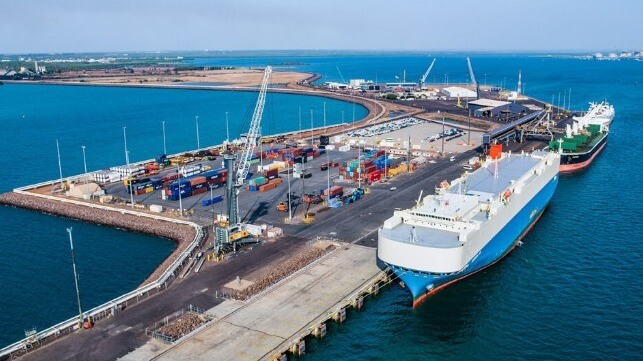China Fights Australia’s Plans to Reclaim Darwin Port Citing U.S. Influence

China is speaking out vehemently opposing plans by the Australian federal government to take back the leased Port of Darwin, terming the move as "ethically questionable." The port has become the latest battleground over Chinese influence through port operations with Chinese officials asserting it is all part of the United States’ efforts and a plan to advance militarization in northern Australia.
Fueling the anger are reports in the Australian media that U.S. private equity firm Cerberus Capital Management is preparing to make a bid for the port’s operations which are currently under a long-term lease to Chinese operator Landbridge Group. Reports are pointing to the similarities between this proposal and the announced deal for BlackRock to acquire control of the two Chinese-run terminals at the Panama Canal and MSC’s role in acquiring Hutchison’s global terminal operations.
China is speaking out against the plans to take back the port as reports in the Australian media revealed Cerberus’ interest in Darwin. Media outlet ABC (Australian Broadcasting Corporation) is reporting that earlier this month, a representative of Cerberus met with Darwin Port's management.
The Australian revealed the talks saying the New York-based firm is willing to slightly pay above the A$506 million (US$328 million) that Landbridge paid for the 99-year lease in 2015. Cerberus it is being pointed out has close ties to the Trump administration, with co-founder Steve Feinberg stepping down as the firm’s chief executive to become the Deputy Secretary of Defense.
Darwin is one of Australia’s major ports for trade with the Asia-Pacific region. As a naturally occurring deep water port, the facility is strategically placed to be a vital link with the international marine shipping trade. With an annual throughput of 4.5 million cargo, the port is also a major supply center for Australian oil and gas projects.
The Port of Darwin was a recurring topic during Australia’s federal elections earlier this month, with both Labor and the Liberal-National coalition promising to ensure the facility reverts to Australian control. Prime Minister Anthony Albanese, who managed to secure a second term, spoke of two options, one of which was to have an Australian-owned company take control of the port, or possibly nationalizing the port to being a government asset.
Landbridge won the lease for Darwin port in 2015 signing an agreement with the Northern Territory government despite objections including concern voiced by the U.S. Landbridge committed to make investments to improve the port, but in late 2024 reported financial difficulties sparking discussions over the port’s future.
China's ambassador to Australia Xiao Qian released a strongly-worded statement on Sunday saying the contract between Landbridge and Northern Territories government must be respected. He contends it was an open and transparent bidding process, fully compliant with Australian laws and market principles. He asserts that over the past decade, the operator has made significant investments in maintaining and building the port’s infrastructure, optimizing its operations and management, and expanding its customer sources.

that matters most
Get the latest maritime news delivered to your inbox daily.
“These efforts have brought remarkable improvements to the port, turning its financial situation from losses to profits and contributing positively to local economic and social development. Such an enterprise and project deserve encouragement, not punishment. It is ethically questionable to lease the port when it was unprofitable and then seek to reclaim it once it becomes profitable,” said Qian.
Today, China’s newspaper Global Times released a long editorial saying Darwin has become a “political football” in Australian politics and saying the issue of control only surfaced “after so-called ‘concerns’ were voiced from Washington.”
The newspaper asserts the port has been transformed over the past decade with about US$55 million in investments and upgrading port facilities. It asserts if the Australian government takes the “drastic steps of forcibly taking back Darwin Port,” it would undoubtedly leave “enduring pitfalls for the country.” They call the choice between a prosperous hub for trade or the eye of a geopolitical storm a test of Australia’s strategic wisdom.
